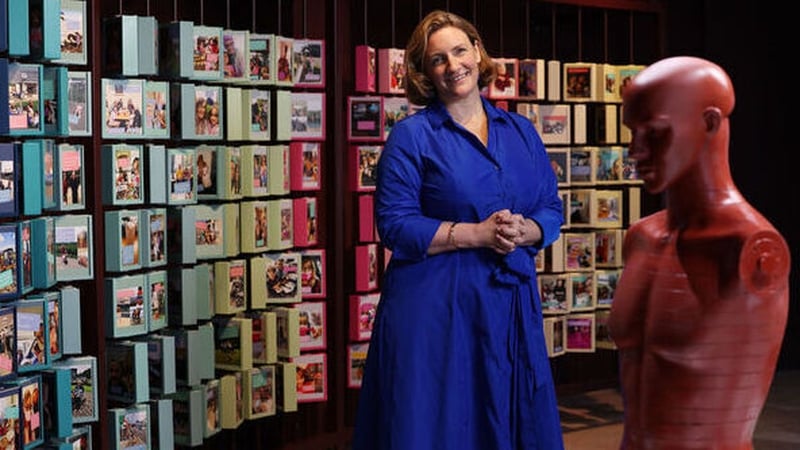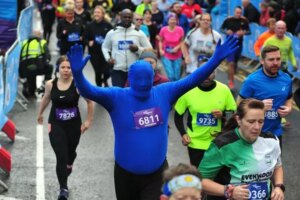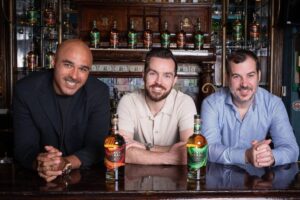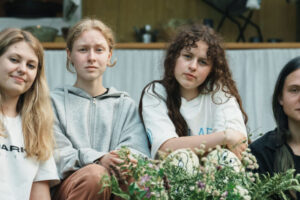
Ireland is becoming a world leader in early detection cancer research, according to Breakthrough Cancer Research.
The charity has praised the work of Irish scientists and researchers in the fight against cancer at the opening of a “powerful and immersive” free exhibition in Dublin.
‘Cancer Revolution: Science, Innovation and Hope’ was developed by the Science Museum Group in the UK and specially adapted for an Irish audience.
It highlights key Irish contributions to cancer science and delves inside the research that’s changing lives and the breakthrough technologies shaping the future of treatment.
“Ireland is making a huge contribution, from how we can try to detect cancer earlier,” said Orla Dolan, CEO of Breakthrough Cancer Research, especially in pioneering new treatments.
“The idea that you can replicate the whole of the human body in digital form and test treatments out so you can personalise the treatment,” Ms Dolan told RTÉ News.
Breakthrough cancer research said that the exhibition “pulls back the curtain” and presents cancer in all its stages in an “understandable way so that people are hopeful about the work going into the future”.
The exhibition also included stories of personal experiences of cancer, including the case of Caitríona Greene, a mother of two from Donegal, who was diagnosed with breast cancer in 2021.
Two weeks after she had a double mastectomoy, Caitriona found out that she was eight weeks pregnant with her second child.
“It was a terrifying journey,” she said.
“I just prayed everyday that the baby would arrive safely and thank God she arrived healthy and strong, perfect and we so blessed and I was able to continue my treatment.”
Caitríona Greene, pictured with her two children at the exhibition, was diagnosed with breast cancer in 2011
Ms Greene documented her cancer journey by taking a picture every day from the first diagnosis to the end of her treatment a year later.
The photos are included in the exhibition and show the highs and lows along the way including the birth of her second child.
“I’m just reminded of all the love and I’m so grateful to be here today,” Ms Greene said.
Businessman and former dancer star Michael Flatley has said that his cancer diagnosis made him realise that the disease does not “discriminate”.
“It doesn’t matter if you’re a child, it doesn’t matter if you’re an older person, it doesn’t matter if you’re middle aged, it doesn’t matter what your nationality, country, country, or religion,” he said.
He was treated for a malignant melanoma in 2003 and two years ago he underwent surgery after diagnosis of an aggressive form of cancer.
“It was completely unexpected,” Mr Flatley said.
“And I remember getting the news, I faced that doctor and I asked my wife to leave the room. It’s something that I will never ever forget in my life. It’s life-changing,” he said.
Mr Flatley’s cancer story is also featured in the exhibition alongside a flute that brought him joy as he faced cancer for the second time.
Other cancer survivors donated a range of items from a knitted doll that a child received during her treatment, to a turban made for a person facing cancer treatment during the Covid-19 pandemic.
Walking poles used by a person to complete the 800km of the Camino de Santiago following a cancer diagnosis were also donated.
Visitors can also experience close-up the complexity of tumours through a three-metre large scale tumour 3D installation created especially for the exhibition.
Immunologist Dr Luke O’Neill said he was hugely impressed by the exhibition.
“They’ve recreated a massive tumor full of the immune cells that are getting in there, trying to kill the tumor using their weapons,” he said.
“And the immune system has very powerful weapons that it uses to kill viruses, for instance. Now those same weapons are now being mobilised against the tumor,” he said.
One in two people in Ireland will be diagnosed with cancer in their lifetime. Breakthrough Cancer Research said hard-to-treat cancers like lung, pancreatic, brain, stomach, liver, and oesophageal continue to have poor outcomes.
Breakthrough Cancer Research focuses its efforts – through cutting-edge, patient-focused research – making sure that no cancer, no person, and no family, is left behind.
“There are more than 220,000 cancer survivors living in Ireland today, that’s the equivalent of a whole new county of people,” Ms Dolan said.
“That progress didn’t happen by chance. It happened because of research. But we cannot stop here. The exhibition is an invitation to see how far we’ve come – and how far we can still go.”
‘Cancer Revolution: Science, Innovation and Hope’ is suitable for everyone aged eight and up and runs until the end of October on the first floor of St Stephen’s Green Shopping Centre.





